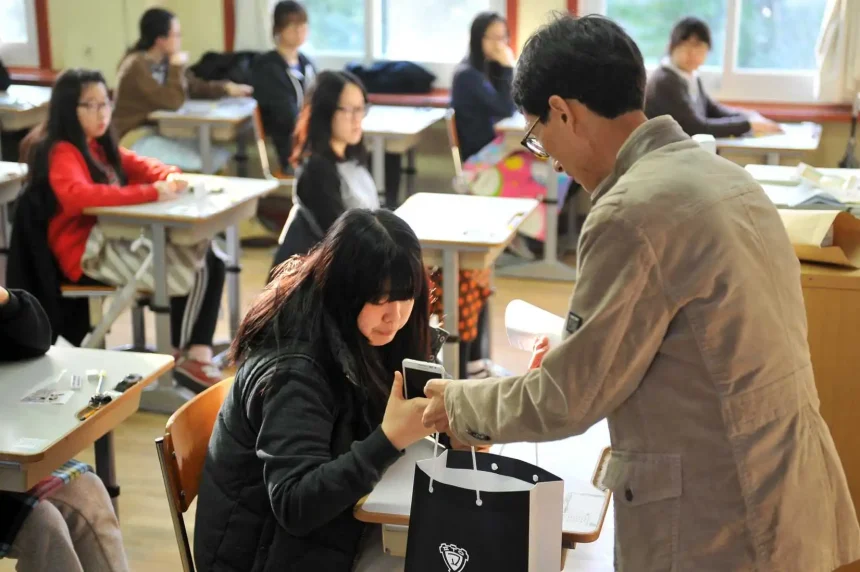South Korea has become the latest country to restrict smartphone use among students after parliament passed a bill banning phones and smart devices during class hours in schools.
The law, which takes effect in March 2026, was backed by lawmakers across party lines in response to mounting concerns over smartphone addiction and its impact on learning and mental health.
It passed with 115 votes in favour out of 163 members present.
Supporters argue the measure will help students focus on academics and reduce distractions. Parents and teachers say excessive smartphone use has hurt students’ performance, while limiting time for study, extracurricular activities, and even friendships.
“Children these days just can’t seem to put their smartphones down,” said Choi Eun-young, a mother of a 14-year-old in Seoul.
“Even when they’re with friends, they quickly go back to their phones. Naturally, this interferes with learning as well.”
A 2024 government survey found nearly a quarter of South Korea’s 51 million people are overly dependent on their phones. Among teenagers, the figure jumps to 43%. More than a third of teens also admitted struggling to limit the hours they spend scrolling social media.
While most schools already restrict phones informally, the new legislation makes South Korea one of the few countries to enshrine such a ban in law.
Other nations, including France and Finland, apply bans mostly in younger grades, while Italy, the Netherlands, and China extend restrictions across all schools.
Cho Jung-hun, the opposition lawmaker who sponsored the bill, said he was motivated by similar steps overseas and by growing medical research. “There is significant scientific proof that smartphone addiction harms students’ brain development and emotional growth,” he said.
The law prohibits phone use during lessons but also empowers teachers to restrict usage across school premises. Exceptions are provided for educational purposes, emergencies, and students with disabilities or special learning needs.
Reaction among teachers has been mixed. The conservative Korean Federation of Teachers’ Association welcomed the measure, citing surveys showing nearly 70% of teachers face classroom disruptions linked to phones. The group said the law gives “a much firmer legal basis” for enforcement.
But the Korean Teachers and Educational Workers’ Union has withheld official support, with some members worried the law infringes on students’ rights. Critics argue that phones are not the root problem—rather, South Korea’s intense academic culture and its high-stakes university entrance exam, the Suneung, push students into constant stress and competition.
“Students have no space to connect except through apps like KakaoTalk or Instagram,” said Cho Young-sun, a high school teacher. “Targeting phones ignores the real challenges they face.”
Some students share that view. “Rather than just taking phones away, we should be taught how to use them healthily,” said Seo Min-joon, an 18-year-old who opposes the ban. “Confiscation doesn’t solve anything—students will still be on their phones at home or on the bus.”
ALSO READ TOP STORIES FROM NIGERIAN TRIBUNE
WATCH TOP VIDEOS FROM NIGERIAN TRIBUNE TV
- Let’s Talk About SELF-AWARENESS
- Is Your Confidence Mistaken for Pride? Let’s talk about it
- Is Etiquette About Perfection…Or Just Not Being Rude?
- Top Psychologist Reveal 3 Signs You’re Struggling With Imposter Syndrome
- Do You Pick Up Work-Related Calls at Midnight or Never? Let’s Talk About Boundaries






